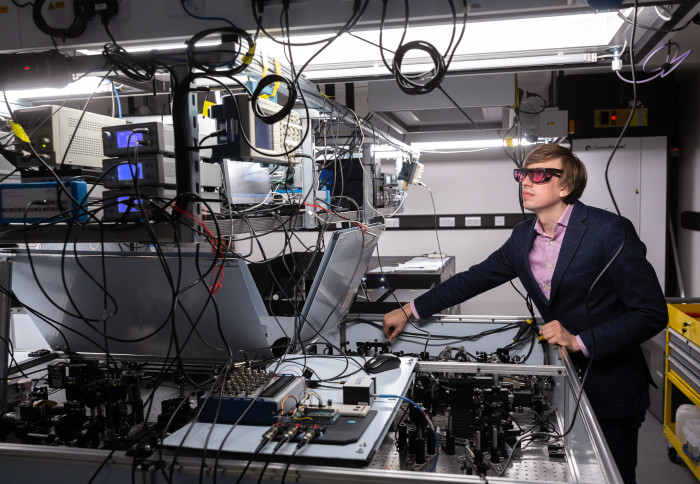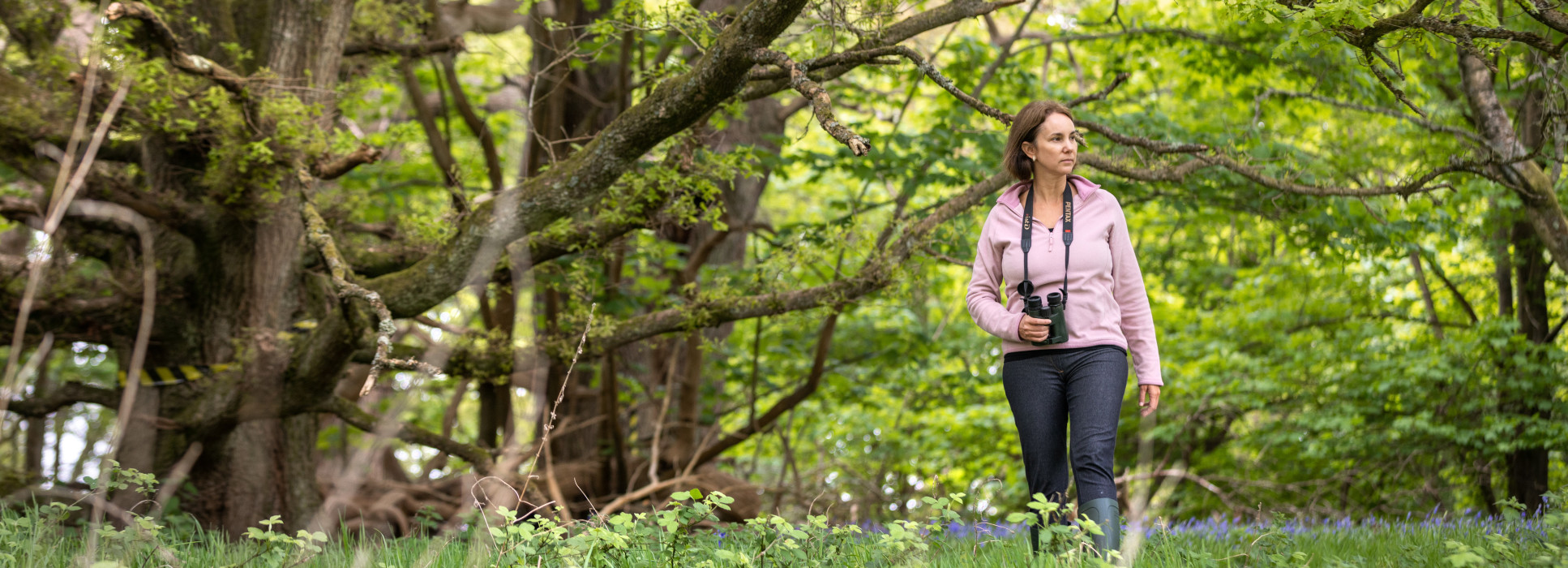REF 2021: a huge thank you from FoNS Dean, Professor Richard Craster

Dr Artem Bakulin working in the Molecular Sciences Research Hub at Imperial's White City Campus.
The recently published Research Excellence Framework (REF) results show improvements in every area of assessment for Imperial.
It makes me immensely proud to work alongside such committed, talented colleagues... whose work not only contributes directly to societal impact, but who also devote their careers to fundamental science that underpins many other areas of impactful work. Professor Richard Craster Dean of the Faculty of Natural Sciences
REF 2021 ranked Imperial top in the UK overall, with a greater proportion of 4* “world-leading” research than any other UK university. The College also ranks first in the UK for research outputs, first in the UK for research environment, and first for research impact among Russell Group universities.
“There’s much to celebrate within FoNS, and I’d like to say a huge thank you to all those who dedicated time and energy to our REF submissions last year,” said Professor Richard Craster, Dean of the Faculty of Natural Sciences. “It makes me immensely proud to work alongside such committed, talented colleagues across the natural sciences whose work not only contributes directly to societal impact in myriad ways, but who also devote their careers to the fundamental sciences that underpin many other areas of impactful work”, he continued.
Commenting on the “phenomenal amount of hard work” that goes into REF, Professor Craster extended particular thanks to all the departmental REF leads, Impact case study authors, and Craig Bryce and Greg Hunt in the Faculty team, who all helped deliver the FoNS submission.
Professor Paul French, FoNS Vice-Dean (Research) echoed these sentiments: “The REF exercise gives us a lot to think about and celebrate. Our Faculty submitted more than 400 staff to five Units of Assessment across Natural Sciences, where our research scope ranges from, for example, fundamental advances in group theory, quantum and particle physics, through molecular and synthetic biology, artificial intelligence, automated fabrication in molecular science, elucidating mechanisms of disease, mitigation of climate change in agriculture and planetary exploration.
“This strong foundation in fundamental and applied science underpins our REF successes and our progress going forward.”
FoNS highlights
It was the first REF submission for our Centre for Environmental Policy, which achieved 15th in the UK overall in the Geography and Environmental Studies Unit of Assessment along with colleagues from the Grantham Institute and Environmental Research Group. The trio also placed 2nd in the country for impact, with 88% of their impact being rated 4*.
Life Sciences and Physics successfully increased their overall 4* ratings, both scoring very high percentages of research considered world-leading or internationally excellent. Chemistry increased its overall ranking from 6th to 4th place, due in part to a significant increase in the percentage of research outputs rated as 4* and topping the national rankings for research environment. Maths increased its overall ranking to 3rd in the UK with significant increases in 4* rating of both outputs and impact, and also ranking first in the country for research environment.
FoNS impact
We’ve gathered some of the Faculty of Natural Sciences Impact case studies, which provide a taster of the impressive breadth of research across FoNS, and which contributed to our REF 2021 results:
Protecting biodiversity in Brazil – and beyond
Brazil’s Atlantic Forest – one of the most biodiverse areas in the world – has suffered great losses in habitat since the arrival of European settlers. Dr Cristina Banks-Leite (Department of Life Sciences at Silwood Park) has researched the best way to restore this fragile forest ecosystem, safeguarding the biodiversity of the region and providing vital water security for the farmers and residents of Brazil’s most populous state, São Paulo.

Dr Banks-Leite identified the minimum forest cover required to maintain biodiversity in these forests (30 percent), a result that has now influenced three different pieces of policy in Brazil. One was a federal law that created priority maps for restoration in Brazil, which if implemented would not only prevent species losses, but also would sequester one billion tonnes of CO2 equivalent, while reducing costs by US$28 billion compared to business-as-usual approach.
Dr Banks-Leite is now looking to apply her methods to other key biodiversity hotspots around the world to develop forest cover thresholds suited to each unique biome.
Find out more about Dr Banks-Leite’s research helping preserve biodiversity in Brazil's precious forests.
Moving more to reduce air pollution
Changing how people move around cities can make them less polluted, healthier, and safer. Imperial researchers lead the London arm of the Europe-wide PASTA (Physical Activity Through Sustainable Transport Approaches) project, which aims to find out how this can be made a reality, and just how large the benefits could be.
Through their results, the team have provided evidence for the co-benefits of reducing air pollution by encouraging more active transport. For example, one study found that people who cycled in cities had better self-perceived general health, better mental health, greater vitality, lower self-perceived stress and fewer feelings of loneliness.
Another study showed that swapping the car for walking, cycling and e-biking even just one day a week can reduce personal CO2 emissions by 0.5 tonnes over a year. For the UK, where the average personal CO2 emissions are 1.8 tonnes per year, this is a significant change.
Lead researcher Dr Audrey de Nazelle (CEP) said: “For example, as London is trying to grapple with major health problems such as air pollution, social isolation, and obesity, why not tackle them together and get a bigger bang for our buck by promoting walking and cycling?”

Preventing damaging cyber attacks
Cyber attacks can cause huge disruption and loss – for example the WannaCry ransomware attack in May 2017 targeted around 200,000 computers across 150 countries, causing financial losses reaching approximately $4bn and causing the National Health Service in England and Scotland to turn away non-critical emergencies and divert ambulances as it tried to deal with the impact of the attack.

As part of work that has been ongoing since 2010, researchers from the Department of Mathematics led by Professor Nick Heard and Professor Niall Adams have developed statistical methods and data science techniques that have helped strengthen cyber security across systems used by hundreds of millions of people globally. They created bespoke statistical tools to analyse data streams from computer networks: filtering, modelling and then performing anomaly detection to identify statistical outliers.
The research group has collaborated with Los Alamos National Laboratory, Microsoft and EY, and these collaborations have led to joint research publications and patents, which have subsequently been adopted in cyber-security software benefiting users worldwide with improved security and safety.
Tackling treatment-resistant cancers
Some patients with cancer can become resistant to existing treatments, driving the need for more effective therapies. In a bid to design new forms of treatment, chemists, biologists and clinicians at Imperial College collaborated on inventing a new drug, now named Samuraciclib.
The drug targets an enzyme called CDK7, involved in directing cells through their lifecycle, which consists of growth, DNA replication and cell division.
CDK7 is also involved in the process of transcription, a vital step in gene expression – the creation of proteins to carry out critical cell functions. Particular cancers, such as Tamoxifen-resistant and triple negative breast cancers, have a unique dependence on transcription, meaning targeting CDK7 may be particularly effective.

The discovery of the drug was spurred by an initial meeting between Professor Anthony Barrett, from the Department of Chemistry, and oncologist Professor Charles Coombes from the Department of Surgery & Cancer. From early research, a large collaborative team was eventually founded for drug discovery from ‘bench to bedside’, co-directed Professors Barrett and Coombles and with Professors Simak Ali and Matthew Fuchter respectively in Surgery & Cancer and Chemistry.
Samuraciclib, licenced to Carrick Therapeutics, has passed Phase II clinical trials and has received Fast Track status from the US Food and Drug Administration (FDA) both in mono- and combination therapies.
Providing renewable power to refugee camps in Rwanda
 Millions of people around the world lack access to reliable electricity. Community-scale solar ‘minigrids’ can help provide this power in a sustainable way, but require complex energy system models to be deployed effectively.
Millions of people around the world lack access to reliable electricity. Community-scale solar ‘minigrids’ can help provide this power in a sustainable way, but require complex energy system models to be deployed effectively.
Professor Jenny Nelson, Dr Philip Sandwell, Hamish Beath and Javier Baranda Alonso from the Department of Physics developed a model for minigrid design incorporating factors such as battery storage technology, equipment usage strategies and institutional loads like health centres. Using this, they collaborated with MeshPower in Rwanda to install and analyse their solar minigrid in Mahama refugee camp, powering a health centre and other facilities which serve 60,000 people who live in the camp.
The work is estimated to save around 6,300 kg CO2 per year by offsetting diesel generation, has facilitated electricity access in the new maternity clinic, and has increased security via streetlights. MeshPower hired an employee to operate the system and many jobs will be created in the long term via connections for around 25 refugee businesses.
Their research has shown that renewable minigrids can provide cheaper, cleaner electricity and extend the benefits of energy access to displaced populations.
Article text (excluding photos or graphics) © Imperial College London.
Photos and graphics subject to third party copyright used with permission or © Imperial College London.
Reporter
Hayley Dunning
Communications Division
Claudia Cannon
The Grantham Institute for Climate Change